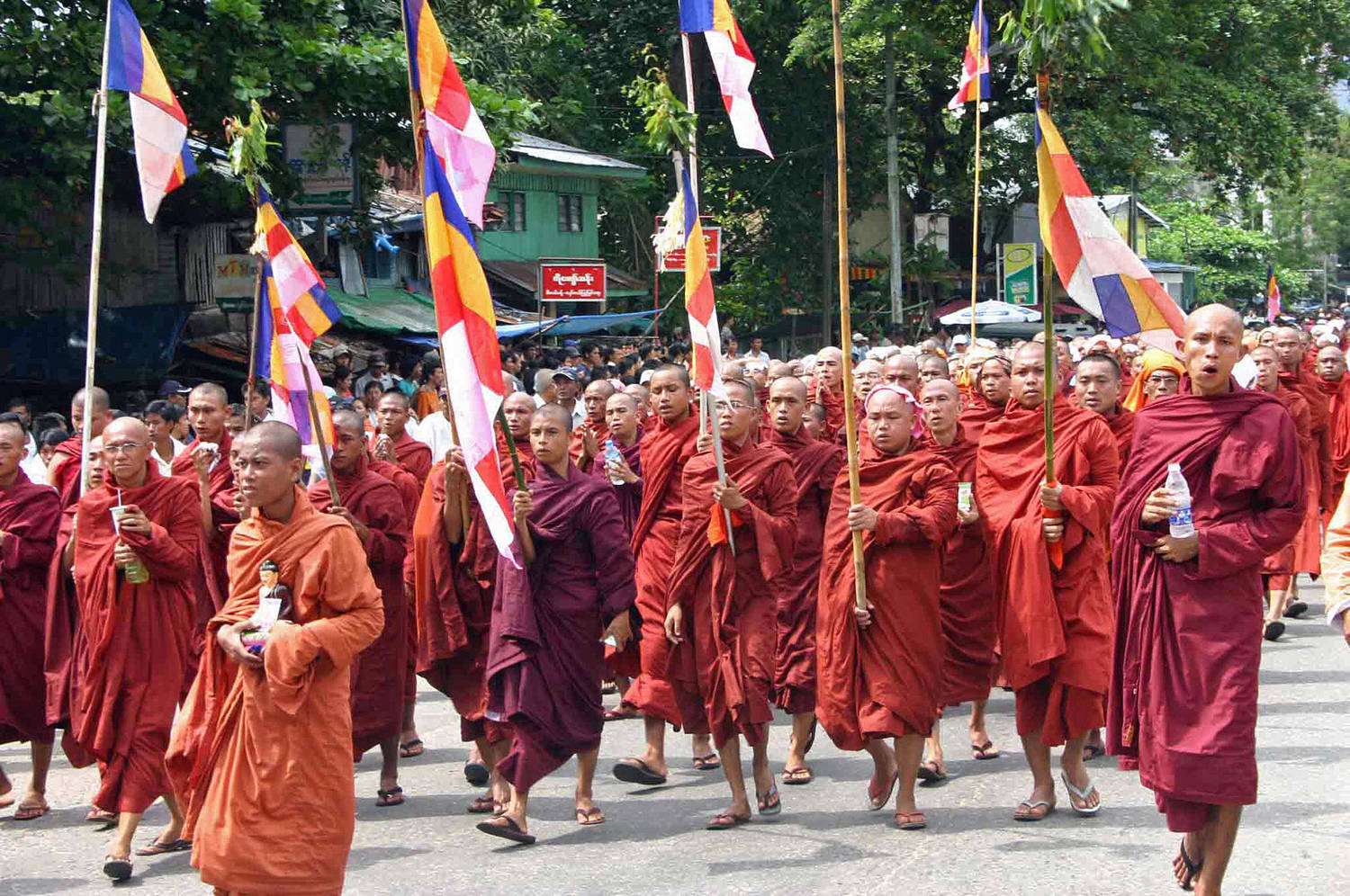
Myanmar´s political transition period has seen a rise in ethno-religious conflicts and increased politicization of religion. Buddhist-Muslim violence and the insurgence of Buddhist nationalist groups create new challenges for Myanmar´s democratization process. In particular, the 2015 election campaign has shown that religion can be used as a divisive identity marker and that Buddhist concerns are well-suited for electoral mobilization.
Radical Buddhist groups openly support the government, and they have asked their followers not to vote for Aung San Suu Kyi and the National League for Democracy on the grounds that she is too soft on the ‘Muslim issue’. Moreover, during this year´s election campaign several Muslim candidates have been excluded from running from elections, leaving the Muslim population largely without political representation.
The mobilization of Buddhist monks in support of the government is in stark contrast to the massive mobilization of Buddhist monks against the military regime during the 1988 uprising and the so-called Saffron Revolution in 2007. Myanmar´s transition to democracy creates new spaces for monastic political activities, but to what extent this strengthens the democratization process itself is an open question.
This public seminar will discuss the role of religion in the up-coming elections and analyze the ways in which Buddhist political thought and practice might support – but also create challenges to – Myanmar´s transition to democracy.
This is the third and final out of a series of three public seminars where leading experts will analyze various aspects of the relationship between Buddhism and conflict, focusing on Myanmar, Thailand and Sri Lanka. The seminar series is organized by PRIO in collaboration with Norwegian Peacebuilding Resource Centre, NOREF.
Please contact Iselin Frydenlund (project leader) at isefry@prio.org for further information.
Full programme:
Wednesday 7 October 2015
Moderator: Audun Aagre
10:00-10:20: Iselin Frydenlund: Introduction, “Does Buddhism Support Democracy?”
10:20-11:00: Matt Walton: "Buddhist Influences on Burmese Political Thought"
11:00-11:40: U Aung Tun: “The Rise of Buddhist Nationalism and the Myanmar Elections 2015”
11:40-12:00: Marte Nilsen: "Buddhist Nationalism and Electoral Competition – How Religion Matters"
12:00-12:45: Lunch
12: 45-14:00 Panel debate with Dr. Matt Walton, U Aung Tun, U Soe Myint Aung. Moderator: Audun Aagre.
Participants:
Dr. Matthew J. Walton Matthew J Walton is the Aung San Suu Kyi Senior Research Fellow in Modern Burmese Studies at St Antony’s College, University of Oxford. His research focuses on religion and politics in Southeast Asia, with a special emphasis on Buddhism in Myanmar. Matt’s current book manuscript explores Burmese Buddhist political thought and its influence on Myanmar’s current democratic transition. He has published articles on Buddhism, ethnicity, and politics in Myanmar in the Journal of Burma Studies, Journal of Contemporary Asia, Asian Survey and Social Research. His analysis of Buddhist nationalism in Myanmar (co-authored with Susan Hayward), Contesting Buddhist Narratives: Democratization, Nationalism, and Communal Violence in Myanmar, was published in 2014 in the East-West Center Policy Studies series. Matt is also one of the co-founders of the Myanmar Media and Society project.
Aung Tun is an independent consultant for several development organizations inside Myanmar. He is working on political parties, elections, peace building and local governance issues. His research focuses on ethnic politics, political parties, elections and political economy of the country. He was a journalist inside the country for several years before. He often contributes his op-ed on Myanmar current affairs to the Diplomat and the Asian Times online.
Dr. Marte Nilsen is a historian of religions and a Senior Researcher at the Peace Research Institute Oslo, PRIO, specializing on Southeast Asian affairs, particularly Thailand and Myanmar.
Soe Myint Aung is a founding board member of the Yangon-based Tagaung Institute of Political Studies (TIPS) and a PhD candidate in political science at the University of Oslo. He previously served as the Program Manager of the Open Society Institute and the National Democratic Institute for International Affairs in Burma/Myanmar. He was educated at the University of Yangon and at Sciences Po, Paris, where he received a Master's degree.
Audun Aagre is Director of the Norwegian Burma Committee since 2013. He is been engaged in Burma/Myanmar issues since the early 1990s and has in-depth knowledge of Burmese civil society and political parties. He is also an experienced journalist and photographer for a variety of leading media stations, magazines and newspapers in Norway. He has also produced a record together with the Burmese musician Mun Awng.
Dr. Iselin Frydenlund is Senior Researcher at the Peace Research Institute Oslo, PRIO and Research Fellow at the Norwegian Centre for Human Rights, Faculty of Law, University of Oslo. She is a religious studies scholar working in Sri Lanka and Myanmar, focusing on Buddhism, politics, and violence.
The other two seminars in this series are:
- Clash of Universalisms? - 13 May 2015
- Insurgencies, Counterinsurgencies and the Question of 'Buddhist Violence'- 16 June 2015





